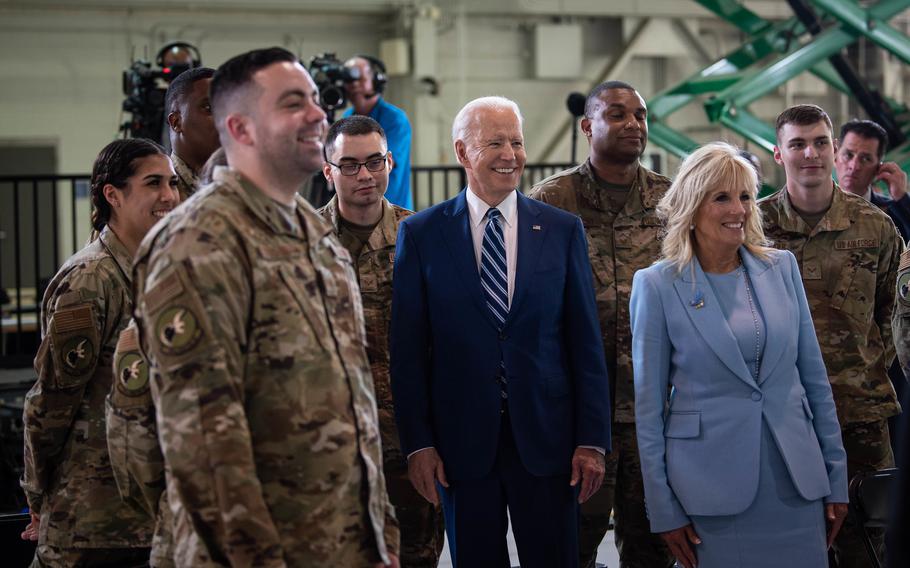
President Joe Biden and first lady Jill Biden interact with service members at Joint Base Langley-Eustis, Va., in May 2021. (Marcus Bullock/U.S. Air Force)
WASHINGTON — President Joe Biden on Tuesday directed the Pentagon to begin reviewing military pay and benefits to make certain service members are being paid fairly and can afford basic needs such as food and housing.
The study — known as the Quadrennial Review of Military Compensation — is conducted every four years to examine whether military pay and other benefits are suitable. Its goal is to make certain service members are being paid comparatively to what they would see in the civilian market and can afford necessities. The review is Biden’s first as president.
“Our great nation has the finest fighting force in the world and it remains our sacred obligation to take care of our men and women in uniform,” Biden wrote in a memo ordering the review. “Our service members deserve a 21st century military compensation system that recognizes and rewards their contributions, reflects the values of our nation, and incentivizes the next generation of men and women to serve.”
The president outlined five areas of focus for the review:
• Compensation and benefits, including special pay, to ensure the Pentagon is “appropriately” paying service members, while also being responsible with taxpayer money.
• The basic pay table to ensure it strengthens “economic security” for troops, improving the Pentagon’s ability to recruit and retain service members.
• Compensation as it relates to future requirements in technology and other defense-critical fields.
• Formulas that are used to calculate the costs of housing, food and other necessities and cost-of-living allowances — including the military’s new Basic Needs Allowance — to make certain troops are food secure and able to afford suitable housing.
• Evaluate the military’s benchmark for compensation to learn how a shift toward dual-income households and other income factors might warrant foundational changes, including military spouse unemployment, frequent moves and the cost of child care.
The Basic Needs Allowance is a supplemental payment given to active-duty troops who have dependents and a gross income below 130% of federal poverty guidelines. The allowance was authorized last year by Congress and the first payments started going out this month. Troops can inquire about eligibility, but officials said each of the military services will proactively screen and notify troops who qualify for the supplemental income.
The order for the new pay and benefits review comes just weeks after the Pentagon announced the largest year-to-year increases in food and housing allowances in decades. The department said food allowances would increase 11% for 2023 and housing payments by an average of 12%.
The study will be the first since research in the past couple of years has found military families to be experiencing hunger disproportionately compared to nonmilitary families — something the Center for Strategic and International Studies, a Washington-based think tank, views as a national security concern.
A 2019 survey by the U.S. Army Public Health Center and U.S. Department of Agriculture Economic Research Service, for example, found 33% of 5,600 respondents at one military installation were marginally food insecure. For comparison, the Agriculture Department found among all U.S. households it is 18%.
In 2020, a Blue Star Families survey found 14% of about 4,500 enlisted active-duty family respondents reported low or very low food security, compared to 10.5% of all U.S. households, according to USDA data. Further, the Rand Corp. reported this month that roughly 25% of active-duty service members lack sufficient access to food, adding personnel and people who live on-base are especially at risk.
“The higher rate of food insecurity among military personnel is surprising and needs to be better understood,” according to the report by Rand, a California-based think tank.
In late 2021, Defense Secretary Lloyd Austin voiced concern about hunger in military homes when he announced several moves to help troops and families who said they were fiscally compromised by the coronavirus pandemic. He’s also temporarily raised the housing allowance in more expensive areas and extended reimbursements for relocation expenses to areas with housing shortages.
“I know that this is on the minds of our military communities, and it's certainly top of mind for me,” Austin told reporters at the time. “When it comes to making sure our people have enough to eat, we have created a new toolkit that will help leaders identify service members who are struggling and connect service members and their families to resources and support programs.”
“Those who have served our country shouldn’t struggle to put food on the table or keep a roof over their head,” Rep. Sara Jacobs, D-Calif., a member of the House Armed Services Committee, said in a tweet earlier this month. “I will keep fighting to expand the Basic Needs Allowance so our service members can make ends meet.”
In calling for the review, Biden underscored military pay and benefits have a significant effect on recruiting. Each of the services have voiced concerns with recruiting difficulties in recent years — partly because fewer than 25% of young Americans between the ages of 17 and 24 qualify physically and academically to serve in the armed forces, according to Pentagon data. Previous compensation reviews have led to significant changes in military pay and benefits, such as raising hazard pay and using different criteria to calculate the housing allowance.
Biden ordered the review to begin immediately and be finished by January 2025.